20 February 2024
Francie Molloy not seeking re-election to Westminster
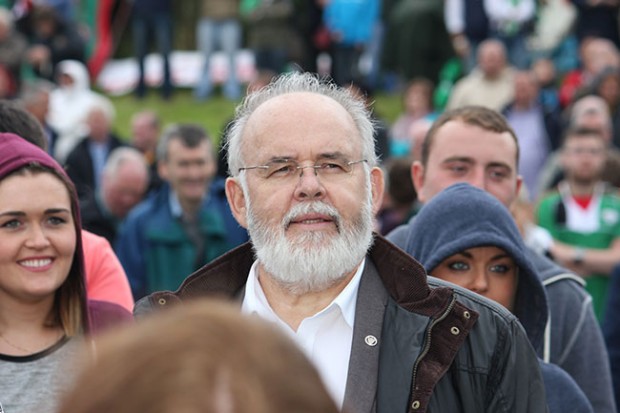
• Francie Molloy
One of Sinn Féin’s longest serving elected representatives, Mid Ulster MP, Francie Molloy, has announced that he will not be standing for re-election in the forthcoming Westminster elections.
Molloy, who was first elected to Dungannon District Council in 1985 has been an MP since 2013 having succeeded his party colleague, the late Martin McGuinness.
Politically active since the 1960’s, Francie Molloy has played a central role in Sinn Fein’s fortunes over the course of many elections, having stood for the party at all levels – Council, Assembly, Westminster and Europe.
In a statement to An Phoblacht Molloy said, “Having been an MP for almost 11 years I felt the time was right for me to step back from front line politics. I am very proud and privileged to have held this position and to have represented the people of Mid Ulster for so many years. I will of course remain active in Sinn Féin to support the work of all our elected representatives at every level”.
“When I look back to the time when I first became politically active in the civil rights campaign it is clear there have been major changes. At that time we campaigned for basic rights – the right to vote, the right to housing, for jobs and yet we were battered of the streets.”
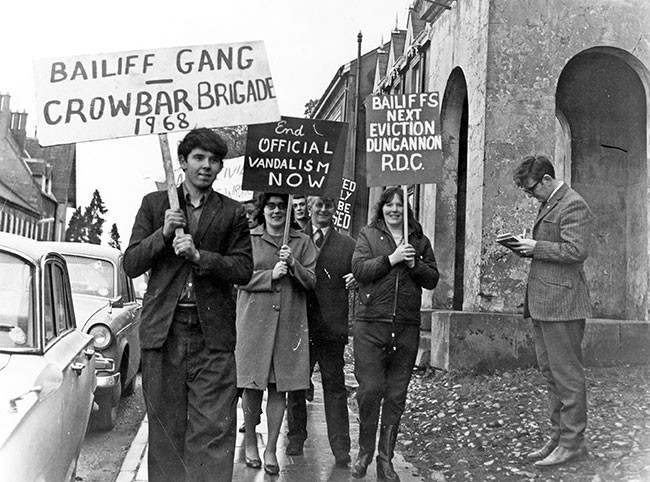
• Caledon courthouse protest (Francie front left)
“I vividly recall the many protests, the rallies and pickets I attended. I particularly reflect on the photograph of myself among a group outside Caledon courthouse in during the case brought against those who took part in the sit-in at the house in Caledon. That sit-in was the event that brought a focus on the discrimination in housing and ultimately led to the end of the state itself.”
“Throughout the last fifty years there have been a number of key notable moments when history was made and I am proud to say that I was part of those moments”.
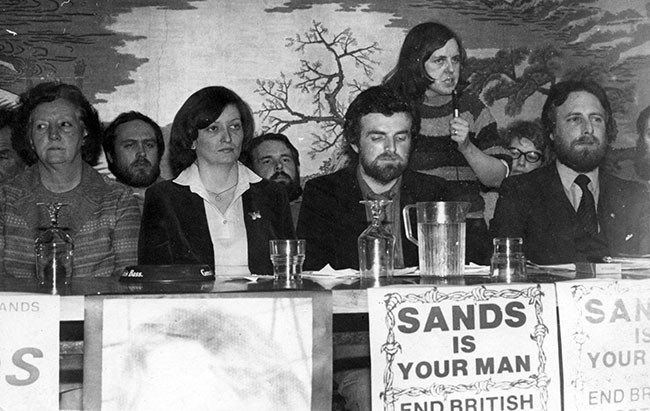
• Bobby Sands’ election campaign (Francie centre back)
“One such period of time was the H-Block/Armagh campaign for prisoners’ rights and the hugely difficult period of the hunger strikes. Those days had a significant impact on me and many people across Ireland”.
“Having been closely involved in Bobby Sands’ election campaign as Director of Elections, I look back with immense pride in having played a part in that piece of history. It was hugely significant for the prisoner’s campaign at that time, hugely significant for electoral politics from a Republican perspective and for me personally”.
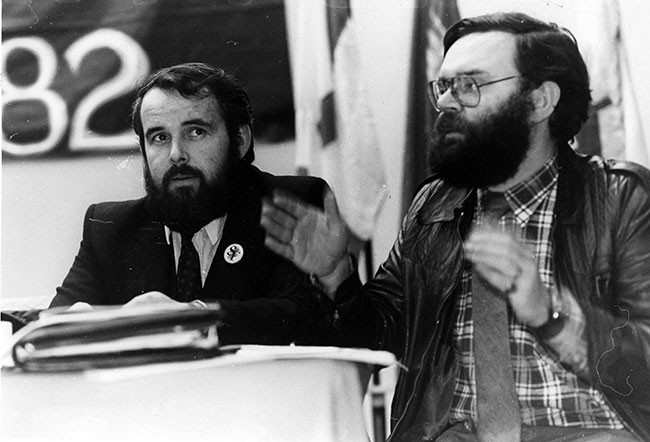
• Francie and Tom Hartley at the Sinn Féin 1982 Ard Fheis
“In the year that followed Bobby’s election I had my own first electoral outing in the Prior Assembly elections of 1982. Despite being unsuccessful in taking two seats in Fermanagh South Tyrone the returns highlighted the he potential that existed and support that was out there for Republican politics”
“I had always advocated taking seats at local government level, having proposed it within the party previously back in 1981. However, by 1985, election success opened the door and I was elected as one of four Councillors to Dungannon District Council”.
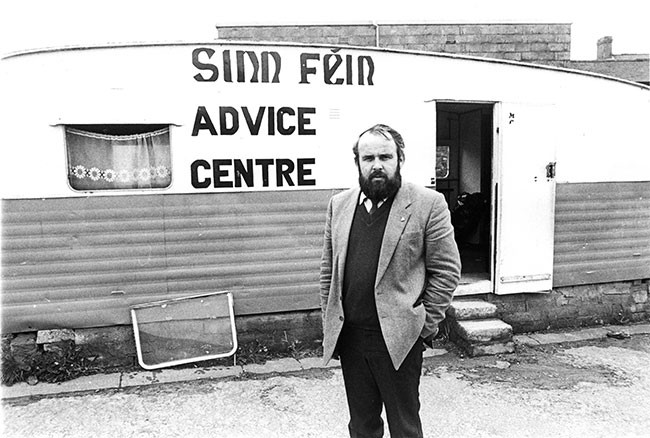
“Over the next four years we stood up for people’s rights, challenged decisions and worked for each and every one of our constituents on a daily basis. It wasn’t always an easy time but it was very rewarding to make a difference to people’s lives”.
“I have always considered local councils to be one of the most effective forums for making a difference to the everyday lives of people on the ground. I still work very closely with councillors as well as council officers and still believe they play a vital role”.
“Being a Sinn Féin activist and elected representative also brought its own risks. A number of colleagues and close friends were murdered for being willing to stand up and challenge the status quo. At this time of speaking about my decision I remember the late John Davey who was murdered on his way home from a Council meeting 35 years ago this week. Many other Sinn Féin colleagues paid a similar price”.
“I hadn’t stood in the 1989 Council elections but I was selected to stand in the Torrent by-election following the death of Martin McCaughey. It was always going to be a tight contest but when asked by Mitchel McLaughlin what help was needed, I asked for Sheena Campbell from Upper Bann to come in and co-ordinate the campaign. We won by a handful of votes”.
“In 1992 my close friend and comrade, Sheena Campbell was murdered in Belfast. A young life cut short. A young woman with unmeasurable potential, a lost leader.”
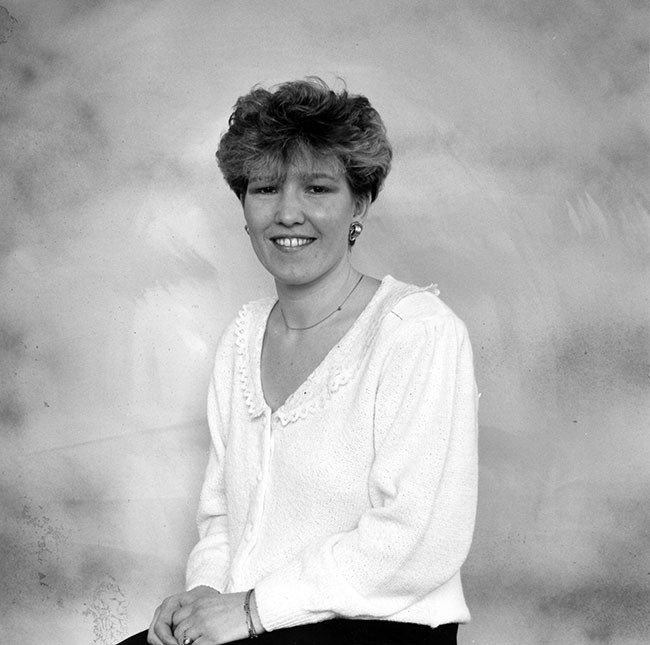
• Sheena Campbell, (below) protest after her murder
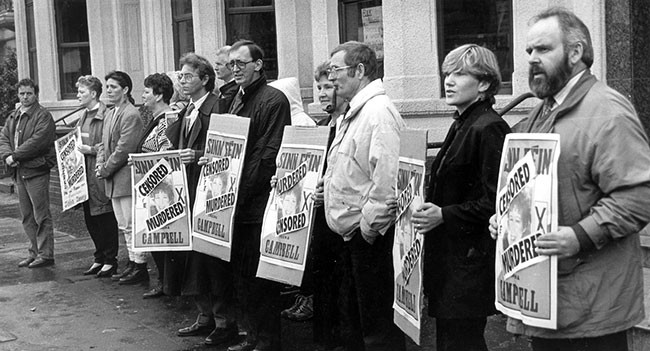
Good Friday Agreement
“As the peace process and political discussions developed, I was privileged to be involved in the work that led to the Good Friday Agreement. I was doing regular meetings and updates for supporters in Britain and would have met regularly with Mo Mowlam prior to Labour coming into government. She was in line to be Secretary of State for the north and was keen to hit the ground running”.
“We would have held early morning meetings in the backroom of a wee café and discussed the issues around all that was going on. Mo had a fierce temper and disagreed with our position on many things but listened. She was always concerned that if they moved on Republican issues that loyalists would react. Mo was someone who was willing and able to argue her position and defend her decision”.
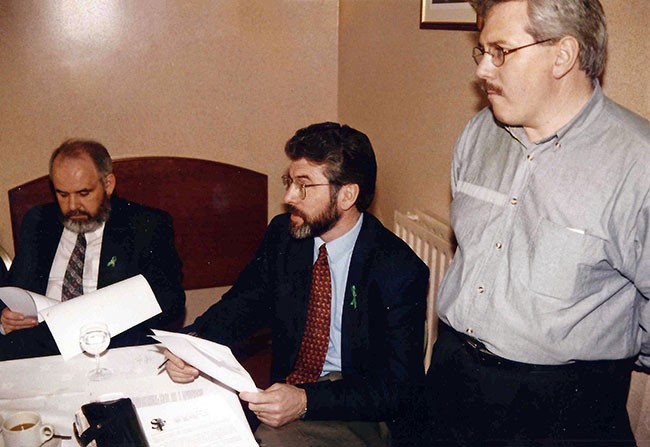
Francie, Gerry Adams and Richard McAuley during Good Friday Agreement negotiations
“The negotiations that lead to the Good Friday Agreement were historic in themselves. The outcome changed the face of politics in Ireland and opened new opportunities to everyone”.
“When the Assembly opened it was very much a new experience for everyone involved. It was stop start and I feel that it reinforced my belief that we needed to be in there.”
“As we got down to work as MLAs we got offices going, employed staff continued to do what we had been doing for years – representing people who needed our help. In my office, Michelle O’Neill came on board and carried out that role. She later would get elected to Council and become the first female Mayor of Dungannon, setting out on her own journey of history making”.
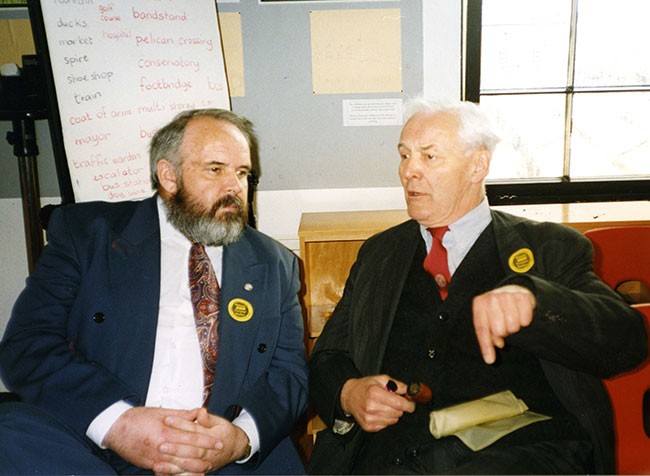
• Francie with Tony Benn
“In subsequent years there were many more challenges in the Assembly and outside it. I was still on Dungannon Council and was proud to hold the position of Mayor. The workload was huge, I could be down in the Assembly in the morning, up the road at lunchtime and maybe back down the Assembly in the afternoon. But it was a privilege to be able to do”.
“During my time as Mayor, I initiated the Return of the Earls project. It was a time of change in the district, many people working abroad were returning home to work,new communities from across the world were coming into the area for work and there was a sense of change and optimism”.
Assembly 2007
“Following the 2007 re-establishment of the Assembly I was elected again for Mid Ulster along with Martin McGuinness and Michelle O’Neill”.
“The party nominated me to the role of Deputy Speaker and later Principle Deputy Speaker. Again, I felt hugely honoured, and felt that it was a recognition of the many years of campaigning and representation. I had proposed taking our seats and this role was fulfilment of that and something I really enjoyed. I worked with many people during that time including the Speaker, Willie Hay. He was someone I felt was always open to finding solutions to issues and I am honest to say I learned a lot from him”.
MP for Mid Ulster
“The issue of dual mandates came to the fore and Sinn Féin took the decision to end dual roles of MLAs being MPs. Having been elected in 1997 Martin McGuinness decided that he was standing down as MP and asked me to stand as our candidate. While I was very happy in the Assembly and the role of Deputy Speaker, I also wanted to take the next move and follow in the footsteps of Tom Mitchel, Bernadette Devlin and Martin McGuinness”.
“In March 2013 I was elected and MP for Mid Ulster. I reckoned then that if I got four or five years it would be good. However, following the 2013 by-election there were then elections in 2015, 2017 and 2019. Four elections in a short 6 years marked a tumultuous time in politics”.
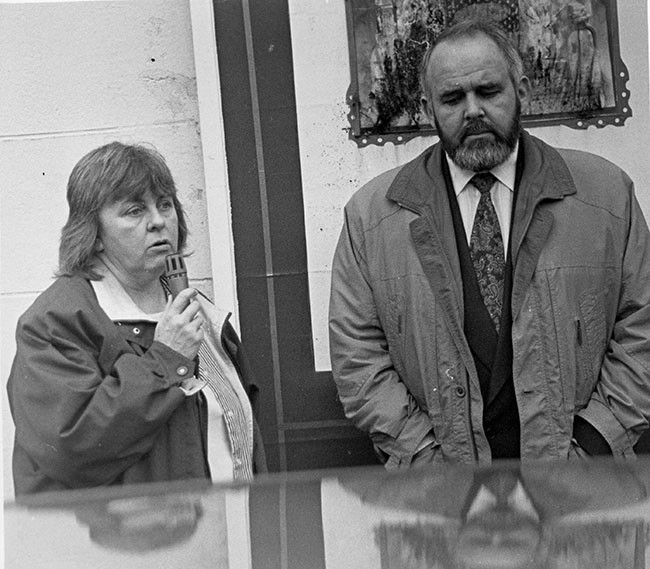
• Bernadette Devlin McAliskey and Francie
It has been a great time to be in politics, working for the people, watching the Assembly build, fall and build again”.
“When I started out going along to civil rights protests I never imagined the journey I would go on. Now, having been a Councillor, an Assembly Member, Deputy Speaker of the Assembly, a Member of Parliament, I can truly say it has been a remarkable road”.
“As I step away from the front line I was proud to watch on from the Gallery in the Assembly chamber as my friend and colleague, Michelle O’Neill began her role as First Minister”.
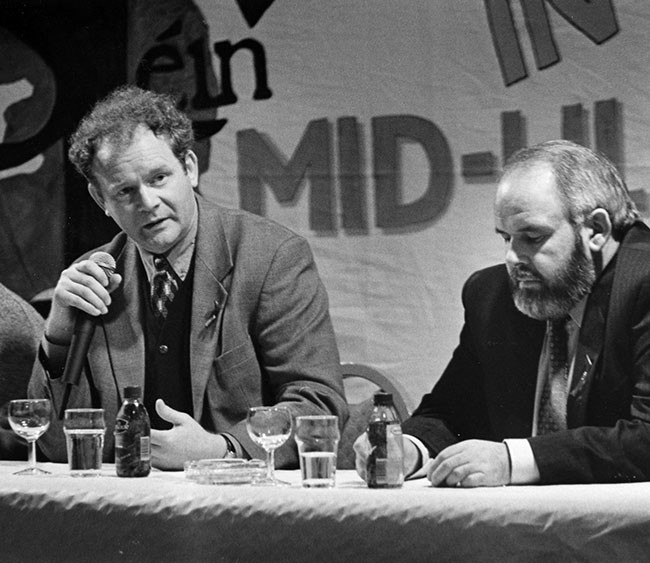
• Martin McGuinness and Francie at a meeting in Toome
Follow us on Facebook
An Phoblacht on Twitter
Uncomfortable Conversations

An initiative for dialogue
for reconciliation
— — — — — — —
Contributions from key figures in the churches, academia and wider civic society as well as senior republican figures





